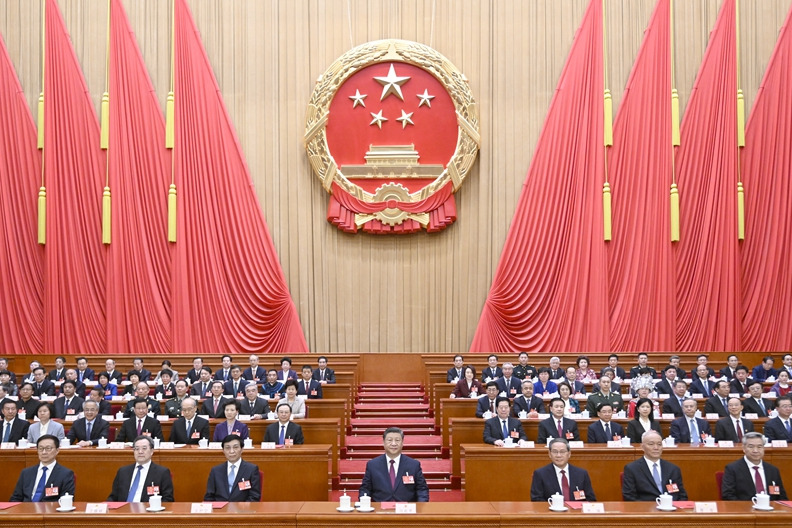Beating the snags in AI quest

The path to the widespread adoption of artificial intelligence is arduous, with a need to strike a balance between technological prowess and sustained economic growth. Liu Yifan reports.

As the race for artificial-intelligence supremacy heats up, evolution in the field is propelling AI's transition from a build-out phase to broader adoption, highlighting the importance of its "physical manifestation" in redefining industries and reshaping the relationship between humans and machines.
While challenges, such as overinvestment and ethical dilemmas in AI, loom large, experts say striking a balance between technological progress and human-centered development is essential to ensure sustained growth.
Chinese-mainland technology startup DeepSeek wowed the world months ago by unveiling large language models to take on dominant tools like OpenAI's ChatGPT, and they're built with just a fraction of the costs and consume much less computing power.
The development is more than a fleeting hype. It marks a profound transformation in AI's accessibility and application.
Making AI accessible
Man Lap, co-founder and managing partner of Hong Kong-based Beyond Ventures, says reduced costs for using large language models and lower entry barriers in hardware will democratize access to AI technologies, enabling smaller players and startups to compete more effectively with entrenched giants.
He says this is particularly important in industries heavily reliant on automation, natural language processing and machine learning.
According to the BlackRock Investment Institute's three-phase framework tracking AI's progress, it is still in its build-out stage, requiring significant capital investment to unlock innovations, while the adoption phase, where technologies are widely implemented, has yet to begin in earnest, even as new players enter the mix.
The final phase, BlackRock predicts, will bring economywide productivity benefits, but only after AI tools are built and broadly adopted.
However, the rise of efficient, cost-effective large language models suggests that AI may progress through these phases more quickly than expected.
The pace of adoption has been accelerating. On the Chinese mainland, city governments like Guangzhou's in Guangdong province have started online services powered by DeepSeek, and are exploring new applications.
In the private sector, e-commerce giant Alibaba plans to spend 380 billion yuan ($52.15 billion) in the next three years on cloud computing and AI infrastructure.
On AI's wider adoption, Kenny Shui Chi-wai, vice-president of think tank Our Hong Kong Foundation, points to the importance of AI's "physical manifestation" in its adoption, particularly through robotics.
Xi Ning, chair professor of robotics and automation at The University of Hong Kong, says AI must ultimately be applied to physical systems to translate data-driven decisions into real-world actions.
Shui says integrating AI and robotics is "inevitable and indispensable" for advancing human capabilities and spurring economic growth.
"The initial adoption wave is likely to concentrate on sectors in which existing infrastructure and high scalability already facilitate rapid implementation, such as autonomous vehicles, drones and, eventually, humanoid robots," he says.
Autonomous vehicles, for instance, can use AI to process vast amounts of sensor and camera data to enable real-time decision-making, reducing traffic accidents and optimizing urban mobility.
Humanoid robots have transformative potential for applications in healthcare, customer services and advanced manufacturing. By automating complex tasks, minimizing human error, and operating continuously, AI-driven robotics can achieve unprecedented levels of productivity, scalability and long-term returns on investment, Shui says.
In his 2025-26 Budget speech, Hong Kong Financial Secretary Paul Chan Mo-po reaffirmed the city's commitment to innovation and technology as the cornerstone of economic reform.
To position AI as a "core industry" that could empower traditional sectors, the Hong Kong Special Administrative Region government has allocated HK$1 billion ($128.6 million) for setting up the Hong Kong AI Research and Development Institute, which will spearhead AI's cutting-edge research and industrial applications.
Hong Kong's ambitious push aligns with the nation's broader strategic priorities.
A recent symposium attended by President Xi Jinping and the nation's top entrepreneurs reflects a strong focus on emerging technologies, including AI, robotics and autonomous driving, marking a shift from similar gatherings in 2018 and 2020 that centered on upgrading traditional industries and supply chains.
Morgan Stanley analysts, led by Robin Xing, said China's recent tech breakthroughs, the entrepreneurs' symposium, and the robust capital expenditure investment objectives of the private sector are "early signs of the return of animal spirits (the tendency for human emotion to drive investment gains and losses)" in the country.
Specifically, the global market's focus on AI technology in the Guangdong-Hong Kong-Macao Greater Bay Area has been growing steadily.
Jensen Huang, founder and CEO of US multinational corporation Nvidia, said in a speech to the Hong Kong University of Science and Technology that the Greater Bay Area is "unparalleled" globally in its excellence in AI technology and mechatronics - the seamless integration of mechanical and electronic engineering disciplines.
Shui stressed that collaboration in the Greater Bay Area, particularly among Hong Kong, Shenzhen and Guangzhou, is critical in lifting the AI sector, as each city brings unique strengths to the ecosystem.
Hong Kong offers world-class financial and legal expertise along with cutting-edge research capabilities, while Shenzhen excels in technological innovation, commercialization, and entrepreneurial dynamism; and Guangzhou has robust manufacturing capabilities and industrial infrastructure, he says.
"Together, these strengths form a holistic and synergistic ecosystem that supports the entire AI value chain - from initial research and development to large-scale production and global commercialization," Shui says.
The global AI contest has grown intense as the reasoning models - a new category of specialized language models - are improving exponentially.
John Abbott, founder of US-based Bullpen, an AI wealth tech platform, says Silicon Valley's current focus is on companies building demand-specific applications on top of these AI models.
The veteran entrepreneur, who also founded Emerge9, an alternative assets platform, highlighted China's advantage in AI adoption, given the country's sophisticated manufacturing systems. But he cautioned against overinvestment, noting that AI hype often leads to unsustainable spending.
Apart from rethinking investment strategy, the transition from the AI development phase to widespread adoption calls for various challenges to be addressed.
Tackling pressing issues
Energy consumption is still one of the most pressing issues, Shui says.
AI systems demand immense computational resources, straining infrastructure and raising environmental concerns. Singapore's three-year moratorium on new data centers in 2019 shows the global urgency of this issue.
Shui says ethical concerns also create significant hurdles, as AI's rapid advancement raises questions about privacy, algorithmic bias, accountability and the potential for misuse. "Addressing these challenges requires not only technological innovation, but also robust international cooperation, comprehensive regulatory frameworks, and a commitment to ethical principles that prioritize human welfare."
Yuan Xiaohui, a senior expert and director of the Innovation Research Center at Tencent Research Institute, says the wave of intelligent transformation is fundamentally different from previous industrial revolutions as it begins with the consumer side. "Today, machine intelligence is accessible to everyone, anytime, anywhere."
To fully realize AI's potential, Yuan summed it up succinctly:
"AI transformation should be human-centered. It isn't merely about transforming industries, but fundamentally rethinking the relationship between humans and machines."
Contact the writer at evanliu@chinadailyhk.com
- Food chain shuts three outlets over violations
- Chongqing charity lifts poetry from the page for partially sighted
- Unions call for better protection of female jobseekers, employees
- Yangjiang scales up green energy plans
- Stations bring citizens, govt closer
- 'Red capital' emerges as economic powerhouse




































